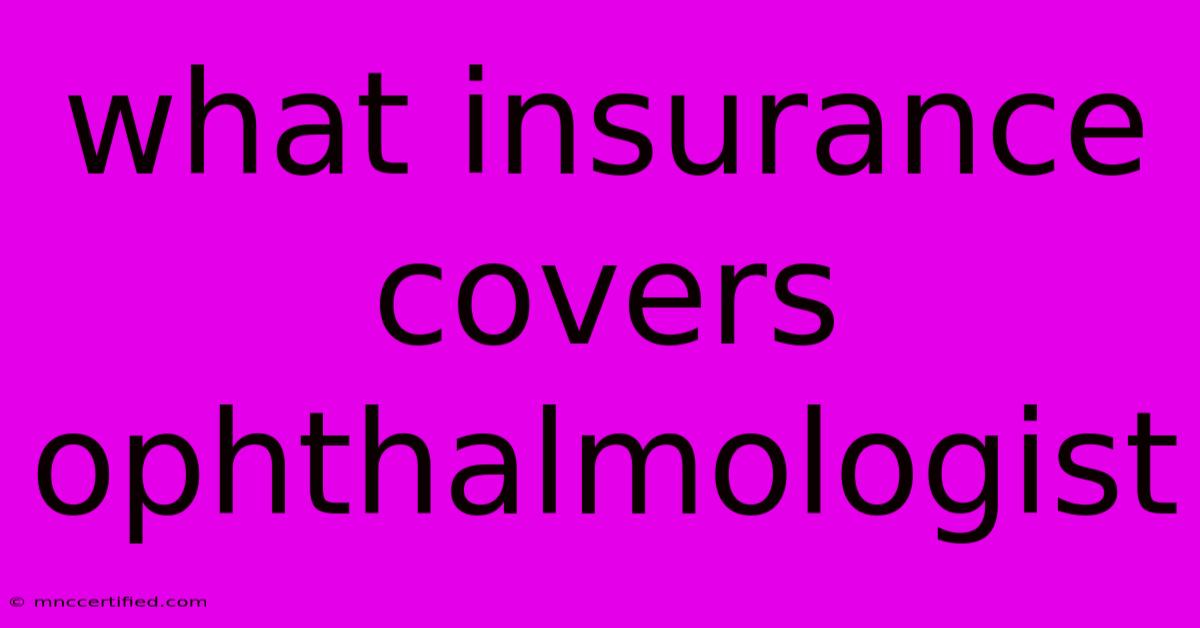What Insurance Covers Ophthalmologist

Table of Contents
What Does Insurance Cover for Ophthalmologist Visits?
Seeing an ophthalmologist, an eye doctor specializing in the diagnosis and treatment of eye diseases, is crucial for maintaining good eye health. However, the cost of these visits can be significant, making insurance coverage a vital factor in accessing necessary care. This article will delve into the specifics of what insurance plans typically cover when it comes to ophthalmologist appointments.
Understanding Coverage Basics
Insurance coverage for ophthalmologist visits varies based on the specific plan you have. Generally, plans cover the following:
- Routine Eye Exams: Most insurance plans cover at least one comprehensive eye exam per year. This exam includes vision testing, eye health assessment, and detection of potential eye conditions.
- Diagnosis and Treatment of Eye Conditions: Coverage for diagnosing and treating eye conditions, such as glaucoma, cataracts, macular degeneration, and diabetic retinopathy, is usually included. This includes procedures like laser surgery, medication prescriptions, and follow-up visits.
- Eyeglasses and Contact Lenses: While coverage for these items is not guaranteed, many plans offer partial coverage, typically with a yearly maximum. You will often have to meet a deductible before the coverage kicks in.
Factors Influencing Coverage
Several factors determine the level of coverage you receive, including:
- Plan Type: Different insurance plans, including PPO, HMO, and EPO, have varying coverage for ophthalmologist visits.
- Deductible: You may need to pay a deductible before your insurance starts covering ophthalmologist expenses.
- Co-insurance: After meeting the deductible, you may still be responsible for a percentage of the cost, known as co-insurance.
- Co-payment: Some plans require a fixed amount, called a co-payment, for each visit.
- Pre-authorization: Certain procedures or treatments may require prior approval from your insurance company.
What is Usually Not Covered?
While many services are covered, some aspects of ophthalmologist care might be excluded from your insurance:
- Cosmetic Procedures: Procedures purely for aesthetic purposes, such as LASIK for vision correction, are typically not covered by insurance.
- Luxury Items: High-end designer frames or specialized contact lenses may not be covered.
- Out-of-Network Providers: Seeing an ophthalmologist outside your network can result in higher out-of-pocket costs.
Tips for Maximizing Your Coverage
To make the most of your insurance benefits:
- Check Your Plan: Review your policy documents to understand coverage details for ophthalmologist services.
- Ask Questions: Don't hesitate to contact your insurance company directly to clarify coverage specifics.
- Utilize Preventive Care: Schedule routine eye exams to detect potential eye conditions early, which often leads to less expensive treatment options.
- Choose In-Network Providers: Seeing an ophthalmologist within your insurance network can save you money.
Final Thoughts
Insurance coverage for ophthalmologist visits plays a crucial role in accessing necessary eye care. By understanding your plan's specifics and taking steps to maximize coverage, you can ensure that your eye health is properly addressed without incurring excessive costs.

Thank you for visiting our website wich cover about What Insurance Covers Ophthalmologist. We hope the information provided has been useful to you. Feel free to contact us if you have any questions or need further assistance. See you next time and dont miss to bookmark.
Featured Posts
-
Watch Brighton Vs Man City Live Premier League
Nov 10, 2024
-
Cleveland Cavaliers Vs Brooklyn Nets Game Preview
Nov 10, 2024
-
Netflix Arcane Season 2 Episode Release Dates
Nov 10, 2024
-
When Does Arcane Season 2 Episode 4 Air
Nov 10, 2024
-
Prospect Park Fire Dry Conditions Blamed
Nov 10, 2024